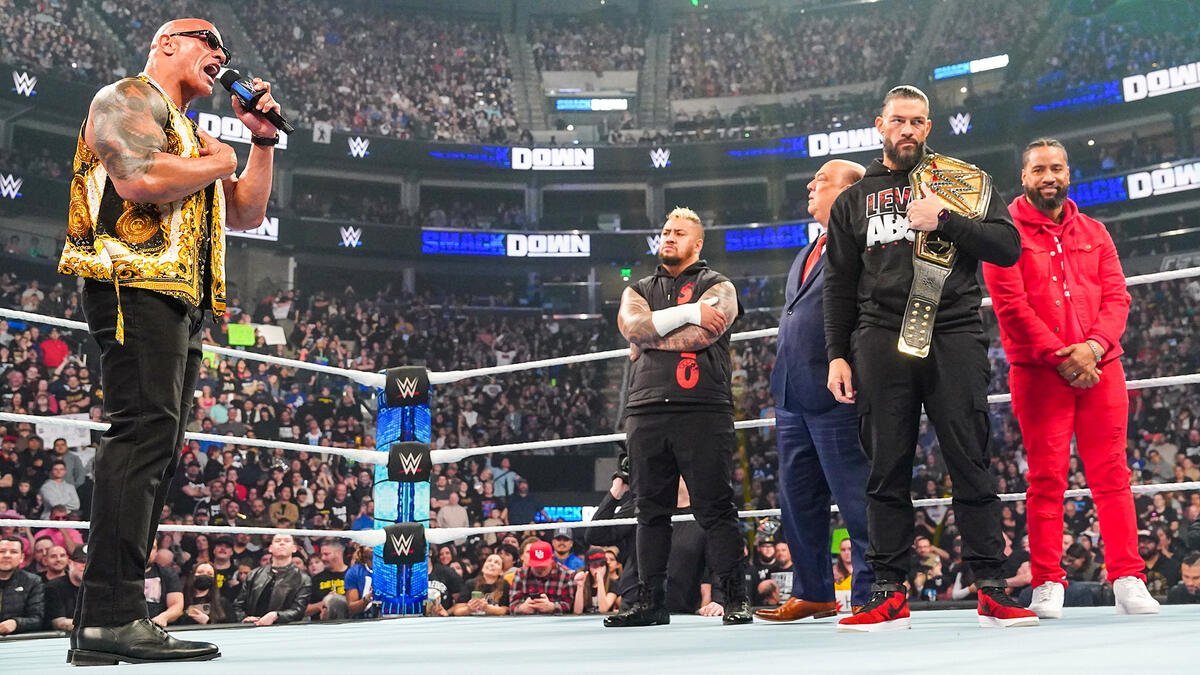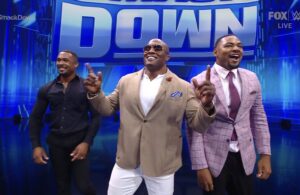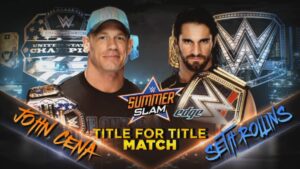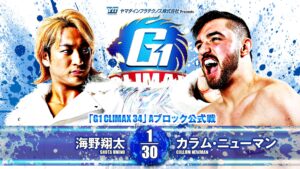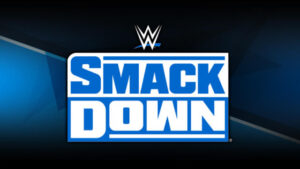Not for the first time, a WWE wrestler’s all-powerful presentation has been a disguise to hide the fact they are insecure, scared, and weak. It reflects a fear many men face daily.
Acknowledge Meme
Recently a meme has been making its way around social media in the tribalistic war between WWE and AEW. It’s the usual comparison between a top WWE and AEW star. It displays the creator’s views of why their brand is better than yours.
On top, Roman Reigns poses with his red ula fala necklace and his tongue poking out. Arms back and open as if inviting a challenge.
Below him is Will Ospreay, a man called by some of the greatest wrestlers in the world. Ospreay, pursing his lips together, looks taken aback, having second thoughts. It implies Roman is the alpha. It’s clear which side of the culture war the creator is backing before the captions.
Ospreay’s is simple because the creator’s perception is that AEW just does wrestling.
Character: is English and wrestles well.
Roman’s caption is two long complex sentences. The implication is WWE creates characters and stories.
Character: delusion, tyrannical, insecure, egomaniacal, “family man” that desperately needs validation from EVERYONE. The reason he is the way he is is because of past betrayals (Seth [Rollins]) and rejection (the fans). Roman goes out of his way to push the “family is everything” mantra yet is beyond hypocritical because he uses and abuses his family members whenever he can.
This is not an article where WWE vs. AEW discord will be compared (I did that with The Undertaker and Sting). It is about how a large part of the success of Roman Reign’s Tribal Chief character and The Bloodline story arch has been built on WWE’s most recent exploration of toxic masculinity.
Toxic Masculinity Defined: Be a Man
Toxic masculinity is the concept that men must conform to old-fashioned, imperfect, and harmful ideals of “manliness”.
Don’t cry. Don’t show emotion because it’s a weakness. Have no feelings. Don’t complain if you’re hurt. Suck it up and be a man. Be always a strong man. Display power and control always. To do otherwise is to be weak. There are dos as well as don’ts.
Men must live up to extreme cultural ideas of masculinity. Be strong and decisive. Display power and control always. Women, children, and men viewed as “betas” are subordinate. Men should have authority over them. You must be athletic and muscular body type. It’s acceptable for men to use violence. You must be the best. You must be masculine in everything you do. Demand respect and if they do not have it, use their power to attain it.
These standards are impossible to achieve, misguided, and cause mental, emotional, and physical harm. The pressure to live up to rigid and unrealistic expectations of manhood kills men.
Jack Urwin’s A Stiff Upper Lip is Killing Men details how his father hid a serious heart condition from his family and a refusal to acknowledge chest pain out of a desire to appear strong resulted in his dad’s death. Suicide in the UK and the US is one of the biggest killers of men under fifty.
In his book, Man Up: Surviving Modern Masculinity, Urwin highlights it’s not just men who suffer. Yet family members, directly and indirectly, are exposed to suffering due to men pursuing/enforcing these toxic traits. As king of his castle and chief of his tribe, men can inadvertently or intentionally hurt the ones closest.
On purpose, accidental, or due to Paul Heyman’s wordsmithery, WWE is exploring this theme in Reign’s manipulation of the Anoaʻi family.
Toxicity In the Bloodline
The head of the household knows best. The stereotype of the toxic male patriarch is domineering and authoritative; a bully who controls “loved ones” through physical, verbal, or mental abuse. He says jump and they reply how high. One man is responsible. One man makes decisions.
But what drives a man to this level of control?
Not having enough control.
In the storyline, Reign has experienced betrayal from teammates and the fans. It’s fed insecurity because Reigns was not accepted as “the man” by fans like they were supposed to.
So, when Reigns returned to win the Universal Championship at Payback 2020, things had to be different. Reigns’ character became all about family because family, as we are told since birth, is what is most important.
You can choose your friends but not your family. In feuding with cousin, Jey Uso, Reign’s character used brute strength to assert dominance.
Their Hell in a Cell match in 2020 was for “the highest stakes of any match in WWE history”. The family became justification to build a shield around insecurity. To protect a fragile ego who wanted from his family, the fans, every other man, the same thing. Acknowledgment.
A Wiseman’s Words
Nine months ago, Reign’s Wiseman and future WWE Hall of Famer, Paul Heyman outlined The Bloodline story arch. On the podcast of legendary music producer and pro wrestling fan/financer, Rick Rubin (Tetragrammaton podcast), over three and a half hours,
Heyman preaches his gospel of wrestling theology. From discussing wrestling, WWE, or his on-air clients like Brock Lesnar and Roman Reigns, Heyman spins mythology.
Heyman talks of Reigns as a great actor and reactor who “stumbled” onto genius and ran with it. Reigns’ catchphrase supposedly was accidental. Regardless of how true this is, it shows the paradox of toxic masculinity. The desperate need of the alpha male to have everything.
“And Roman had said, well, you know what I want from Jay? I don’t want his love. I have that. I don’t want his admiration. I don’t even want his obedience. I’ll take that from him. You know what I need? I’m the head of the table. I am the tribal chief. I need him to acknowledge me. And the moment he said it, we all got chills because we knew this was bigger than this moment… This is the declarative statement. This is the definition of the character. What does the character want? What does the tribal chief need? What does the head of the table seek? Acknowledgment. And it’s emotional.” Paul Heyman. Transcript from podscript.com.
Weakness defines the WWE’s most powerful character.
The Defining Catchphrase
After this declaration, Heyman makes a point of telling Rubin how no other WWE catchphrase from a top wrestler, from Hulk Hogan to “Stone Cold” Steve Austin to The Rock, is the most emotive.
The most revealing and honest. One that isn’t just bravado. If anything, the catchphrases of these previous wrestling icons are more “alpha male” and traditionally masculine.
“Hulkamania will run wild”- is a promise of an unstoppable force of nature. It’s decisive. It’s a promise. It will happen.
“That’s the bottom line”- there’s no argument, what I say goes. It’s an assertion of control.
“Can you smell what the rock is cooking”- it sounds rhetorical but it’s another promise. The man’s going to always deliver.
These catchphrases all show authority, control, and confidence that what the man says goes. Yet Reign’s catchphrase Heyman suggests is different because Reign’s character:
“He’s needy. He needs you to acknowledge him… Please acknowledge me. I’m not here for your love. I’m not here for your affirmation. I’m not here for you to chant my name. I just need you. It’s unbelievable… It puts the power in the audience to react. Anyway, they want. Anyway, they want to boo me, boo me…. You want to cheer me, cheer me… There’s no command…It’s a plea. From a man who doesn’t beg, from a man who rules, from a man who commands the island of relevancy. Please acknowledge me. Please. Just acknowledge me. It’s all I need. I don’t just want it. I need it from you.” Transcript from podscript.com.
Male Fragility and Privilege
The paradox is this assertion of power comes from feeling weak. The need to control comes from feeling out of control. Insecurity, fear, and powerlessness mean what is in the alpha male’s control must be controlled. Their family and possessions are his property. All will serve his will.
Yet was Roman before 2020 weak and powerless? Some kind of “inferior” man? Like some men who think they are weak and powerless and who buy into the promise of toxic masculinity, no he wasn’t. It’s a delusion.
The fans booed because they were fed up with “Roman must look strong”. Roman was the heir apparent, the poster boy. They (we) didn’t want this because the character was flimsy, yet Reigns headlined five Wrestlemanias before becoming the Tribal Chief. Far from weak in most folks’ metrics.
The character is deluded and can’t see the privilege gifted to him because there is one thing he couldn’t have. One thing he could not control. So, to be the best, Reigns manufactures a new reality for himself and his family. Reign’s character insulated his ego using his family as protection.
This kind of fragility is at the core of toxic masculinity. Yet despite Heyman’s later assertions, it’s something WWE has shown before.
Game Playing
Fans from the early 2000s to 2010s can think of one wrestler, now an executive, where implicitly and explicitly, he always “appeared” like he had to be the strongest man in the fed. Part of this was down to booking.
The other part is a myth created by shoot interviews and backstage rumors that painted a picture of Triple H as the embodiment of male insecurity and fragility.
The blurring between the character on screen and the man behind the scenes has almost become one for many fans. Fans saw the man who married the boss’ daughter and supposedly played politics and positioning backstage have stuck.
During the 2000s, Triple H’s “The Reign of Terror” as World Heavyweight Champion drew strong criticism from fans, other wrestlers, and wrestling experts then and in subsequent years. Particularly because in long extensive promos and longer matches, Hunter was positioned as the best, despite some fans feeling onwards.
Max Landis’ 2015 documentary, Wrestling Isn’t Wrestling breaks down the character’s history, highlighting the crossover between the character of The Game overlapping Triple H’s promotion to power backstage. Triple H himself approved, tweeting that Landis: “gets it”.
Putting the debate aside, the character dripped toxic masculinity. Like Reign’s Triple H built a stable (not for the first time) to protect himself with Evolution. Both went to desperate lengths to retain the champion. Both characters informed fans to the point of repetition and parody they were the best. Accept this.
So, is The Bloodline ground-breaking? To an extent, yes.
Prestige TV
Back to Paul Heyman on Rubin’s podcast, Heyman waxed poetic about the Bloodline as being an evolution in wrestling. To a degree, what Heyman says is spin.
The Bloodline storyline he compared to classic gangster films. Prestige TV shows like The Sopranos. As if what WWE is doing is a new form of wrestling. To an extent, Heyman’s right.
Within the WWE bubble, this presentation of a male character, as a “human being” (Heyman spouts) is new and honest. Yet to ignore Reign (the character) is still shielded by bravado and the gimmick of the Tribal Chief, is to drink the Kool-Aid.
Outside the WWE bubble, AEW’s presentation of “Hangman” Adam Page as the Anxious Millennial Cowboy took place around the same time, I will argue in a different article, that explores a different type of masculinity.
Is it ground-breaking because Roman Reign’s character and storyline explore toxic masculinity within the family unit? No. See the dysfunctional family saga of the McMahon’s on-screen. It’s ground-breaking because, despite an invisible camera backstage, WWE employed layers of subtly.
Character work associated with Hollywood and prestige TV rather than Smackdown has been displayed. Particularly during the Sami Zayn arch.
Zayn’s emotive scenes backstage helped cement Sami more as a babyface than his in-ring work. The other key players all played their part also.
Credit where it is due, WWE for a time found a way to feel in part like The Sopranos. Like Breaking Bad or Goodfellows. At points, the storyline has been, and perhaps is for some still spellbinding.
Yet just like those shows/films, it presents toxic masculinity as dangerous but never outright denies calling it out as poisonous.
The Bloodline is Not Shakespearean
As an English teacher, Reign’s grasp of power reminds me of the flawed version of Macbeth. A great and renowned warrior is prophesized to be king. Rather than wait, his ambition and the manipulation of his wife (to be a man) push him to kill the king. The problem is when on top, he’s vulnerable.
Filled with guilt and self-loathing. To deal with these unmasculine feelings, and the growing mental instability, he (over)compensates and hides (poorly) these weaknesses by resorting to traditional masculine solutions. Murder, fear, and tyrannical authority. All of which lead to his downfall.
However, Roman Reigns is not Macbeth or a tragic hero. WWE is not Shakespeare, although wrestling can be Shakespearean. In Shakespeare’s plays the fall of the hero is clear from the beginning. As soon as they ascend, they will inevitably fall. Weakness becomes more obvious and constant.
Listening to Heyman, you think it was obvious how weak and pathetic Reign’s tribal chief is. That each week he is losing control. Nine months later, things have changed.
Clinks in the armor are there. Backstage and at points in the ring he has looked vulnerable. Those dips of powerlessness have felt like temporary blips. Sami hits Reigns with the chair. Cody Rhodes ascended as his successor. Losing the Bloodline Civil War match at Money in the Bank. Losing Jey Uso.
But then, Roman retains his championships. The Bloodline ensures victory regardless. Retain the championship for a record amount of time. Jey left but Jimmy has fallen under the spell of toxic masculinity.
Jimmy felt safer under Reigns than with his brother after SummerSlam. Rather than breaking away, remaining subservient reinforces the status quo.
Without the dips in suspense, some fans have become desensitized. Nothing has changed. Roman must look strong.
What’s The End Result?
Post-SummerSlam, Heyman said the storyline was only at “the bottom of the third innings”. It’s felt like since this point, everything has been a holding pattern.
The Bloodline storyline has gone on longer than a Shakespeare play without the constant threat of downfall. Cody Rhodes might be the heir apparent (again), but even in beating Reigns, The Tribal Chief’s tyranny has amassed an island of eternal relevancy.
A milestone 1304 days (at time of writing) championship reign. Finally, fan acceptance and investment will live as the storyline that brought the creative Renaissance to WWE. Everything the character wanted. The damage will be done. Cody might rebuild on the ruins, but Roman got his way.
The follow-up will likely see The Bloodline continue, with The Rock and Reigns clashing. Not a huge tragic fall on the scope of a Walter White in Breaking Bad or the gangsters in Goodfellows. Toxic masculinity wins.
Booking-wise, the babyfaces have looked weak in not being prepared for the interference that’s cost them their chances.
Good guys, the newer more modern masculine figures of Kevin Owens and Sami Zayn had a Wrestlemania moment but fallen down the card before the unbeatable villain. The WWE authority figures have proven themselves enablers allowing alpha male behaviour to hold them to ransom.
But then, this was a storyline created by an alpha male who reportedly had to control all aspects of creative. A man who could not stand being ill, let alone sneezing because he could not control it.
It’s been continued by a man who likewise portrayed a character who also benefited from toxic masculinity. In a world where alpha males are still celebrated, dominant, and make the rules.
More From LWOS Pro Wrestling
Header photo – WWE – Stay tuned to the Last Word on Pro Wrestling for more on this and other stories from around the world of wrestling, as they develop. You can always count on LWOPW to be on top of the major news in the wrestling world, as well as to provide you with analysis, previews, videos, interviews, and editorials on the wrestling world. You can check out an almost unlimited array of WWE content on the WWE Network and Peacock.


